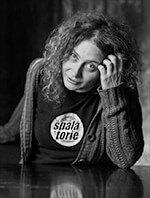Donnerstag, 20. April 2017 um 20.30 Uhr
in der Z-BAR
Lesung & Gespräch mit der Autorin Nicoleta Esinencu (Republik Moldau)
Veranstaltung in rumänischer & deutscher Sprache | Dolmetscherin: Eva Wemme

„Die Theatertexte von Nicoleta Esinencu liest man nicht einfach so geräuschlos weg. Sie wollen laut gesprochen werden, mehrfach, immer wieder. Schon mit den ersten Worten von "A (II) RH +" (sprich: A zwei Rhesus positiv, deutsch von Georg Aescht) ist der Sound da: Der Rhythmus. Die Direktheit, mit der man in ein fremdes Leben hineingeschubst wird, als ginge es einen tatsächlich etwas an. Und die unpathetische Dringlichkeit, die sich aus der Mischung von Alltäglichem mit Unerhörtem ergibt.“
Petra Kohse
„Für mich ist am wichtigsten, Menschen zusammenzubringen. Wenn Russen und Ukrainer und Moldawier friedlich zusammen in einem Saal sitzen und eine Theatervorstellung sehen, ist schon viel erreicht.“
Nicoleta Esinencu
Nicoleta Esinencu will der Spaltung ihrer Heimat entgegenwirken. Die eine Hälfte der moldawischen Bevölkerung orientiert sich nach Russland, die andere wünscht sich eine Anbindung an die Europäische Union.
„Ihre auf Rumänisch geschriebenen Stücke handeln vom Spannungsfeld zwischen Ost und West, vom Clash der Ideologien und Ökonomien. Sie erzählen, wie Geschichte ständig umgeschrieben wird, aber auch davon, wie Hass, Homophobie und Gewalt sich in der postsowjetischen Gesellschaft ausbreiten.Im Westen grenzt die seit 1991 unabhängige Republik Moldau an Rumänien. Im Norden, Osten und Süden wird sie von der Ukraine umschlossen. Ein kleines Land am Rande Europas, die Arbeitskräfte wandern ab, vor allem die Jungen und Gutausgebildeten. Esinencu ist immer wieder zurückgekehrt nach Chişinău.“
Sandra Luzina, Der Tagesspiegel
„Ich schreibe, weil ich über die Gesellschaft sprechen möchte, in der ich lebe, egal wo ich geboren wurde. Die Probleme, die ich benenne, haben keine Grenzen.“
Nicoleta Esinencu

Bild: © Florin Tabarta Nicoleta Esinencu, geboren 1978 Chişinău, studierte Theaterwissenschaft und Bühnenbild an der staatlichen Kunstuniversität in Chişinău. Die Dramatikerin und Theaterregisseurin ist seit ihrem Studium als Autorin und Regisseurin in der Theaterszene Rumäniens und der Republik Moldau aktiv. Nach einem Stipendium an der Akademie Schloss Solitude in Stuttgart wurde sie mit ihrem Stück "FUCK YOU, Eu.ro.Pa!" (2005 in deutscher Übersetzung bei Solitude in Stuttgart erschienen) einem breiten Publikum bekannt. Das Stück löste wegen seiner europakritischen Inhalte heftige politische Debatten in Rumänien und der Republik Moldau aus, gewann den rumänischen dramAcum-Theaterpreis und wurde im Reader des rumänischen Pavillons bei der 51. Biennale in Venedig (2005) veröffentlicht. Es folgten ein Stipendium am Récollets International Accommodation and Exchange Centre in Paris und ein Theaterstipendium in Bourges, Frankreich. Esinencu hat an verschiedenen Residency- und Kulturprogrammen teilgenommen, darunter am Künstlerhaus Edenkoben, am rumänischen Kulturinstitut in Paris und beim Literarischen Colloquium in Berlin. Esinencus Werke wurden in Rumänien, der Republik Moldau, Schweden, Deutschland, Russland, Japan, Frankreich und Österreich aufgeführt.
2007 gründete sie ihre eigene Theatergruppe, das Mobile European Trailer Theatre, das in der Republik Moldau allerdings kaum Arbeitsmöglichkeiten hat. Ebenso in 2007 erschien im Verlag der Buchhandlung Walther König „Nicoleta Esinencu. A(II)Rh+“, ein Band, der Stücke und Essays von Nicoleta Esinencu auf Rumänisch und Deutsch zusammenstellt. 2010 gründete sie in Chişinău den alternativen, theaterorientierten Künstlerraum Teatru Spălătorie, den sie auch leitet. Die Künstlerin, deren Texte in vier Sprachen übersetzt und in Rumänien, Deutschland, Bulgarien und Polen veröffentlicht wurden, war 2008 zu Gast bei der Leipziger Buchmesse und 2010 beim Internationalen Literaturfestival Berlin. 2012 war die Regisseurin mit "Clear History" im Rahmen des Festivals "Many Years After …" erstmals am HAU Hebbel am Ufer zu Gast. 2014 waren dort im Programm "Good Guys Only Win in Movies" die Stücke "Dear Moldova, can we kiss just a little bit?" (gemeinsam mit Jessica Glause) und "American Dream" zu sehen. Zuletzt war sie mit "Life" (2016) -eine Auftragsarbeit für das Festival „Die Ästhetik des Widerstands - Peter Weiss 100“ des HAU Hebbel am Ufer - in Berlin.
Der Literarische Salon Britta Gansebohm
in der Z-BAR
Bergstr. 2, Mitte / Rosenthaler Platz, 10115 Berlin
www.z-bar.de
Freitag, 07. April 2017 um 20.30 Uhr
in der Z-BAR
Reading & Discussion
Carey Harrison will be reading from his new novel How to Push Through (Dr. Cicero Books, published in September 2016)
From Expat to Wahlberliner: Berlin as a Place of Work for English-Language Writers
This series of readings in English, presented by the Literary Salon Britta Gansebohm, constitutes a bridge between the English-language and German literary scene in Berlin. The concept of a reading in a setting reminiscent of a spacious and comfortable living room where all are welcome, with the ensuing discussion also including the audience, was an absolutely new idea in May 1995 when Der Literarische Salon was established. This openness is being expanded through the series “From Expat to Wahlberliner.” The target audience of this series comprises Berliners who hail from a wide variety of countries but speak English and little or no German. The series seeks to make a contribution to international understanding and successful coexistence in Berlin by having resident authors present their colleagues to the public. In one instance the pairing is a reciprocal one: The L.A. writer and Berliner-by-choice Kevin McAleer will be moderating the reading of novelist/playwright Carey Harrison, and on another evening Kevin’s presentation of his mock-epic poem on the life of movie star Errol Flynn will be moderated by Mr. Harrison, whose parents were the actors Lilli Palmer and Rex Harrison and through whom Mr. Harrison, this scion of Hollywood’s Golden Age, once encountered the subject of Kevin’s book-length poem. It is through Lilli Palmer that Carey Harrison also has a special relationship to Berlin, his mother having spent her youth in the city before fleeing from the Nazis to Paris and eventually London. The discussions which follow the readings will treat of such questions as: What impact does life in the German capital have on an author’s writing? Does life in Berlin help to idealize or deflate an author’s view of their homeland? How do expats experience this city along with its inhabitants and Germany in general? What makes Berlin such a special place for writers? How has the city changed for the expats since their arrival? What is their relationship to the German language? Can language also be a kind of homeland? How do Berliners-by-choice define the very word “homeland”?
How to Push Through
This is the final book in a novel quartet called The Heart Beneath, which Carey Harrison worked on for 48 years. He published other novels during that span, but this tetralogy is really his life’s work. It begins with the rescue of a “wild child,” a Waldmensch or Wolfskind, from the forests of Soviet-occupied East Germany in 1947, where the boy, Egon, has lived alone for more than three years. His father was executed following the 1944 assassination attempt on Adolf Hitler and his mother was sent away to her death in the final throes of the war – though not before hiding her son in the woods. Egon is now seven years old and no longer speaks. The tetralogy follows his rehabilitation into society and his return to the wilderness as a teenager in Britain so as to try and recapture his missing childhood. England and Germany are the twin poles of the tale, and the final book of the tetralogy, How to Push Through, is narrated by four women. They include a girl with whom Egon falls in love, and the elderly German psychoanalyst who brings them together. The girl has grown up in a family full of secrets, and her violent teenage years, in reaction to these secrets, lead her to the psychoanalyst and to Egon. The novel quartet is a love story of two people divorced not only from society but separated by national, social and psychological issues.
This series is sponsored by the Senate of Berlin (Senatsverwaltung für Kultur und Europa).
Conceptual assistance and the series title from Julia Eve Föll.
The story of voices, inspired by the Literary Salon, cultural place in Berlin, is a compilation of sound clips from artists, authors and contributors working with and for the Salon. This original story was created collaboratively, sentence by sentence from each participating member. To achieve the feel of a circular story, Britta Gansebohm, the found and director, began and ended the story with a sentence. The voices present in the videoclip are from authors Gernot Wolfram, Kevin McAleer (USA) ,Helmut Kuhn, Liv Larsson (Sweden), and singers Boris Steinberg and Corinne Douarre (France) as well as from several international students from the Macromedia University.
This is a Macromedia project
by Julie Zemanek and Veronika Gajer
Background: The first literary Salon entailed a circular gathering where Britta Gansebohm started with a sentence and each guest was asked to create a sentence so as to create a collaborative story. This video was influenced and inspired by the first event in the Literary Salon in May 1995.

Bild: © privat Carey Harrison is an English novelist and dramatist. He was born in 1944 in London to actors Rex Harrison and Lilli Palmer and raised in Los Angeles and New York where he attended the Lycée Français. He is the author of forty stage plays and sixteen novels. Harrison’s most recent novels Justice and Who Was That Lady? have been acclaimed by readers and both reached No.1 on the Amazon Contemporary Fiction downloads list. His latest novel How to Push Through was published in 2016. Harrison has received numerous grants from the UK Arts Council and his prizes include the Sony Radio Academy Award, the Giles Cooper Award, the Writers’ Guild of Great Britain Award for Best Play, and the Best Play award from the Berlin Akademie der Künste as well as two nominations (2005 and 2007) for the Pushcart Prize for Journalism. His work has been translated into thirteen languages. He himself has published translations from French, Italian, German and Spanish authors, and there have been performances of his translations from the works of Pirandello, Goldoni, Feydeau and Gert Hofmann; most recently he published “20 Poems” from the Arabic of Firas Sulaiman, in Banipal, the UK magazine of contemporary Arabic writing. Harrison’s essays have appeared in magazines as diverse as New Politics, a journal of socialist thought, and Chronicles, a paleoconservative magazine of American culture; he has also been a book reviewer for numerous newspapers and journals. A new opera based on Frances Hodgson Burnett’s The Secret Garden, set to music by Nolan Gasser and with a libretto by Harrison, was commissioned by the San Francisco Opera House and premiered in March 2013, playing to sold-out audiences; three further opera companies are currently planning productions of the opera. Harrison lives in upstate New York with his wife, the artist Claire Lambe, and is Professor of English at Brooklyn College of the City University of New York. He is presently in the German capital as a Fellow of the Wissenschaftskolleg zu Berlin.
Der Literarische Salon Britta Gansebohm
in der Z-BAR
Bergstr. 2, Mitte / Rosenthaler Platz, 10115 Berlin
www.z-bar.de
